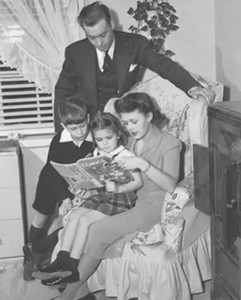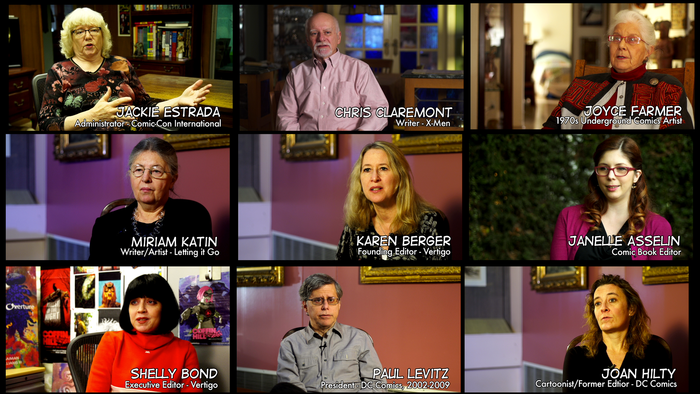Lately, the fight to prove that the comic book industry can no longer be considered a boys club has picked up, but, it turns out, this whole boys club business is a fairly recent concept. Women have always been involved in the comic book and comic strip industry, and the documentary, She Makes Comics, proves just that.
Directed by Marisa Stotter; director of photography, Jordan Rennert; produced by Karen Green, Patrick Meaney, Jordan Rennert, and Marisa Stotter; executive producers, Julian Darius and Mike Phillips; creative consultant, Karen Green; in association with Respect! Films
“Representation is absolutely vital. We need to celebrate the women who work in comics and have always worked in comics and we need to go back and find their stories and bring them to the fore.” – Kelly Sue DeConnick
She Makes Comics is a celebration of the women — from creators to fans — who have and always will be part of an industry that has come to mean so much to many of us. When I was collecting comics in the ’80s and ’90s, seeing names like Ann Nocenti and Jan Duursema told me that there was a place for me in comic shops and on the pages of the comics I loved to read, but watching this documentary has introduced me to so many more amazing women. Which is why I decided to watch this with my daughters, ages nine and six. Disclaimer: There are a few moments of more mature content and language in the documentary, but the opportunity to show them that they truly can be anything they want to be far outweighs a few curse words.
When I interviewed director Marisa Stotter back in May, she and her team were busy running back and forth between interviews and the editing room, going through hours of footage.
“You start with a lot of material because it all seems essential at that time,” says Stotter. “Then you slowly go through it and start to chip away until it tells the story in the most efficient yet affecting way possible. Since we do have a lot of leftover footage, we are including some bonus features and extended interviews in the release of She Makes Comics.”
With the documentary now available for pre-order, Stotter is feeling “Sleepy! But really, a mixture of excitement, nervousness, and relief. I’ve been working on this film for over a year, and I do feel ready to let the world see it. I’m anxious to hear people’s reactions to it, and I hope that they are as moved by it as I was while making it.”
The result of the team’s hard work is a concise, yet incredibly informative hour of men and women talking about the industry and its important moments in history in respect to its pivotal female players. With lots of images and focused commentary from the various interviewees, the documentary smoothly moves through various topics in a style that is very much like a comic itself.
 She Makes Comics begins by pointing out that comic books used to be a household item, with just as many — if not more — girls reading comics as boys, during a time when comics were readily available in general stores, rather than niche comic shops that can sometimes be very uninviting to women. The documentary travels through the industry’s transition into superhero comics, the underground movements featuring comics such as Tits and Clits, the ’90s pin up and badgirl phase, the Friends of Lulu, and more.
She Makes Comics begins by pointing out that comic books used to be a household item, with just as many — if not more — girls reading comics as boys, during a time when comics were readily available in general stores, rather than niche comic shops that can sometimes be very uninviting to women. The documentary travels through the industry’s transition into superhero comics, the underground movements featuring comics such as Tits and Clits, the ’90s pin up and badgirl phase, the Friends of Lulu, and more.
It covers a wide range of people and industry events throughout history, going as far back as the 1920s with women such as Jackie Ormes, who is considered to be the first female African-American cartoonist. It features prominent names like Gail Simone and Kelly Sue DeConnick, as well as women who have worked behind the scenes like former DC publisher Jenette Khan, who encouraged editor Karen Berger to go beyond superheroes to create the DC imprint, Vertigo.
 With the recent backlash against cosplayers who, according to some, are ruining conventions, She Makes Comics is particularly timely as it details the rise of masquerading in the 1970s, led by the “Queen of Cosplay,” Wendy Pini as Red Sonja. Her portrayal of the red-headed she devil inspired many other women (and men) to dress up as their favourite superheroes. While the haters are busy accusing cosplayers of ruining comic conventions with their supposed narcissism and fake geek status, Wendy Pini (who went on to create Elfquest), the ladies of Team Unicorn, and many others, speak about the empowering feeling of being able to dress up as their favourite hero.
With the recent backlash against cosplayers who, according to some, are ruining conventions, She Makes Comics is particularly timely as it details the rise of masquerading in the 1970s, led by the “Queen of Cosplay,” Wendy Pini as Red Sonja. Her portrayal of the red-headed she devil inspired many other women (and men) to dress up as their favourite superheroes. While the haters are busy accusing cosplayers of ruining comic conventions with their supposed narcissism and fake geek status, Wendy Pini (who went on to create Elfquest), the ladies of Team Unicorn, and many others, speak about the empowering feeling of being able to dress up as their favourite hero.
What has Stotter learned after a year of research and interviews, editing and compilation?
“I’ve learned just to what extent women had been involved in comics as early as the turn of the 20th century. It’s frustrating to see how women’s contributions to comics have been all but erased over the decades. My hope is that this film will help shine a light on those contributions and get the comics community talking about women who have gone underappreciated in history.”
This documentary is both entertaining and educational. It stresses the need for a more inclusive industry, arguing not just for women, but for everyone. But most importantly, it is a documentary that inspired my daughters to run off and start drawing their own comics as soon as it was done. And I hope that it will empower other young girls and talented women to do the same.


